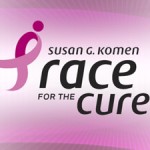by Michelle E. Brown
Originally published on Cherrygrrl.com, May 15, 2011.
 Across the country, every weekend in May, you can find a Komen Walk/Race for the Cure – a cure for breast cancer. Although many in the gay community think of the month of May as a staging period for June’s Pride activities, more and more each year I am seeing rainbow flags mixed in with the pink ribbons walking and running for the cure.
Across the country, every weekend in May, you can find a Komen Walk/Race for the Cure – a cure for breast cancer. Although many in the gay community think of the month of May as a staging period for June’s Pride activities, more and more each year I am seeing rainbow flags mixed in with the pink ribbons walking and running for the cure.
It might not get the amount of publicity some of our other issues like Marriage Equality, Don’t Ask Don’t Tell or ENDA do, but breast cancer is a gay issue too and a cause in which we can find common ground, support and understanding with the community-at- large.
Breast cancer is a life threatening reality for all women. One out of every eight women – that’s 12.6% of all women – will be diagnosed with breast cancer in her lifetime. And it’s not just women who are hit by this equal opportunity killer. Men can have breast cancer too. Male breast cancer is a rare condition but it accounts for about 1% of all breast cancers.
About now you might be saying “Yes I Know.” Like me, you probably have purchased “Breast Cancer” stamps for your letters, made a contribution, have a regular mammogram, and at least try to do a self examination once in a while. But if you WERE like me you probably never actually thought of it as a LGBT issue.
My sister, for the past few years, has walked in the “Breast Cancer Three Day.” When she first told me she was going to walk 60 miles over three days I thought she was crazy. But I knew her commitment to things she believed in. We had trained together for a marathon for stroke research following my parents’ death, which kicked our butts. So I knew she was serious and would do it – that’s my big sister.
In supporting her I educated myself about breast cancer and learned a few things. I learned lesbians have a higher incidence of certain risk factors known to be linked to breast cancer. This is in part because many lesbians choose not to have children or delay becoming pregnant.
Some lesbians may not know about risks factors in their family. Cancer just isn’t talked about in most families. There has been a stigma associated with it over the years. I spoke with one woman who, after she was diagnosed, discovered her grandmother had had breast cancer. If estranged from their family, a lesbian’s access to this information may be impossible.
By far the greatest impact on lesbian health is the tendency for lesbian women to avoid seeking help or not returning for follow-up due to discomfort with the medical system. I’ve had conversations with lesbians who have delayed mammograms – sometimes for economic reasons or lack of medical coverage. This is especially true for groups more frequently found low on the socio/economic ladder. The statistics in the African American and Latino communities are staggering.
My sister isn’t doing the 3-Day in memory of a family member who had succumbed to breast cancer. To our knowledge there is no history of breast cancer in our family. But she is a woman. She has two beautiful granddaughters, friends, and coworkers. She never asked who was at risk or if the research would help any specific group or only heterosexuals. She started doing it to find a cure for all women. She is my SHERO. And each year when she would start training for the 3-day, I gave her 200% support.
I wasn’t doing the 3-day but I did educate myself and started talking about it in my LGBT community. I began to see and talk about how healthcare along with other social justice issues are as much a part of LGBT issues as the marriage debate, DADT and ENDA.
I also worked on me. I changed my eating habits, did monthly self-exams and had my mammograms, but was still at risk.
I was concerned when my doctor told me they need to re-do my mammogram. I was annoyed I had to take another day off from work to be squished and squeezed in that machine again. My concern turned to worry when, after this set of x-rays, they called me back in again, then did a set on different equipment and then took an ultrasound before I was taken into a little room to wait to speak with the radiologist.
I was shocked by the news that I would need a core biopsy and devastated when the result of that core biopsy was cancer. I had done all the right things, donated to Komen Foundation, ate right, exercised , had no family history, but I had cancerous cells in my left breast.
The good news is that, because of advances in technology, my lump was found much earlier than it would have been with older technology. I have friends and family who were there for me. And I have a big sister who does the Breast Cancer 3-Day each year, walking 60 miles, who never knew back when she started this annual crusade for a cure – she was doing it for me.
So amidst all your PRIDE preparations find a Komen Walk/Run in your area, take your rainbow flags, and walk or run in pride for a cure so that another sister, mother, friend, and possibly a lesbian, just like me, can be a survivor.

2 Responses to POV: Our Common Ground – The Race for the Cure